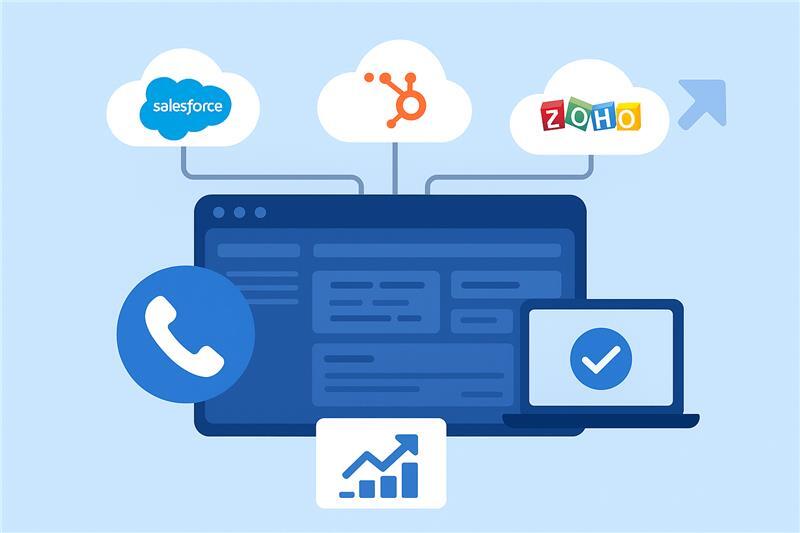
Real-Time Deal Tracking with Salesken AI: Features and Benefits
What Is Real-Time Data Tracking and Why Is It So Important?
Real-time data tracking for sales refers to the continuous monitoring and analysis of sales activities and metrics as they happen. Businesses can quickly make informed decisions by capturing real-time data on sales performance, customer interactions, and market trends.
Real-time data tracking is important because it gives immediate insights into sales operations. This helps companies respond quickly to opportunities or challenges. With real-time tracking, sales teams can adjust strategies on the fly, optimize resource allocation, and improve customer engagement based on the most current data. This leads to enhanced efficiency, better forecasting, and a more agile response to market changes, ultimately driving higher sales performance and competitive advantage.
Traditional Deal Tracking and the Emergence of AI
Before the emergence of AI-powered sales intelligence platforms, sales teams primarily depended on spreadsheets and CRMs to manage their deals. These traditional methods were not only time-consuming but also prone to errors, offering limited insights into the sales process.
New research from Salesforce’s Sixth State of Sales (2024) report reveals that 67% of sales reps anticipate not meeting their quotas this year, with an even more concerning 84% having missed them last year. These figures underscore the immense pressure on sales teams. Productivity issues contribute significantly, as sales reps spend 70% of their time on tasks unrelated to selling, leaving limited opportunities to engage with prospects.1
However, there is a positive trend: businesses are increasingly turning to predictive and generative AI to help sales reps focus on what they do best—selling and building relationships. Currently, 81% of sales teams are either testing or have fully adopted AI technologies. The impact is clear: 83% of sales teams using AI reported revenue growth this year, compared to just 66% of those not utilizing AI.2
This is where Salesken AI comes in. Salesken AI is a powerful conversational intelligence software that provides real-time deal tracking and insights.
.png)
Real-Time Deal Tracking with Salesken’s AI: Key Features
At the core of Salesken AI is the robust feature of real-time deal tracking, providing a comprehensive overview of the sales pipeline and enabling data-driven decision-making.
Here are some key features that make real-time deal tracking a game-changer:
- Centralized Pipeline Management: Track all your deals seamlessly in one location, eliminating data silos and confusion.
- Automated Data Capture: Salesken AI automatically captures key deal information, saving sales reps valuable time.
- Visual Deal Pipeline: A clear and intuitive visual representation of the sales pipeline, making it easy to identify trends and opportunities.
- Advanced Analytics: Powerful analytics tools provide insights into sales performance, win rates, deal velocity, and other key metrics.
- Predictive Analytics: Leverage AI to forecast deal outcomes and identify high-potential opportunities.
- Customizable Dashboards: Create personalized dashboards to track the metrics that matter most to your business.
- Activity Tracking: Maintain a comprehensive record of all interactions (calls, emails, meetings) associated with each deal, providing a clear picture of your progress.
- Actionable Insights: Gain real-time data and analytics about your sales performance, uncovering trends and areas for improvement.
- AI Sales Coaching: Receive personalized coaching tips from Salesken AI, constantly sharpening your sales skills.
Crucial Benefits of Salesken’s AI for Real-Time Deal Tracking
Tailoring interactions based on real-time customer data improves customer satisfaction while streamlining workflows boosts sales team performance. Essentially, real-time tracking transforms agents from passive data collectors into strategic sales professionals. Here’s what you can expect:
- Increased win rates: By identifying at-risk deals early on, you can take steps to improve your chances of closing them.
A 2023 McKinsey report states “that players that invest in AI are seeing a revenue uplift of 3 to 15 percent and a sales ROI uplift of 10 to 20 percent.
- Improved sales forecasting: With more accurate sales forecasts, you can better plan your resources and make more informed business decisions.
Research by the Aberdeen Group reveals that companies with precise sales forecasts are 10% more likely to achieve year-over-year revenue growth and 7% more likely to meet their sales quotas. By mitigating the shortcomings of traditional methods like weighted pipelines, AI provides more reliable forecasts based on robust data insights.
- Boosted sales productivity: Salesken AI automates tasks and provides real-time insights, so your sales reps can spend more time selling.
Accenture reports companies that apply generative AI to customer-related initiatives can expect to achieve 25% higher revenue after 5 years than companies focused only on productivity.
Examples: Solving Sales Challenges with Real-Time Metrics
Salesken AI, with its real-time conversation intelligence capabilities, can significantly amplify the impact of sales metrics. Let's explore how:
Challenge: Low Conversion Rates
- Identify the issue: Use Salesken AI to analyze call recordings and identify common pain points or objections raised by prospects.
- Provide targeted coaching: Salesken AI can suggest specific coaching points based on identified issues, helping reps address objections effectively.
- Optimize sales pitch: By analyzing successful and unsuccessful calls, Salesken AI can provide insights into the most effective sales pitches.
Challenge: Long Sales Cycles
- Identify deal stages: Use Salesken AI to pinpoint where deals are getting stuck in the sales cycle.
- Optimize sales process: Based on conversation intelligence analysis, Salesken AI can suggest process improvements to accelerate deal progression.
- Improve sales rep efficiency: By identifying time-consuming activities, Salesken AI can help reps focus on high-impact tasks.
Challenge: High Sales Rep Turnover
- Identify top performers: Analyze call recordings of top performers to identify best practices.
- Provide coaching: Use Salesken AI to provide targeted coaching to underperforming reps based on their call performance.
- Improve sales onboarding: Identify key skills and knowledge required for success through call analysis.
Challenge: Inaccurate Sales Forecasting
- Improve deal qualification: Salesken AI can help identify qualified leads earlier in the sales process, improving forecast accuracy.
- Predict deal outcomes: By analyzing conversation data, Salesken AI can predict the likelihood of closing a deal.
- Optimize resource allocation: Using predictive insights, sales teams can allocate resources effectively.
By combining the power of real-time metrics and Salesken AI's conversation intelligence, sales teams can achieve a deeper understanding of their performance, identify opportunities for improvement, and ultimately drive revenue growth.
Salesken AI: Real-Time Metrics for Sales Agents, Leaders, and Managers
Real-time tracking provides invaluable insights for sales performance management. Here's a breakdown of metrics for different roles:
For Sales Agents
Valuable Insights:
Activity metrics, such as calls made, emails sent, meetings booked, and social media interactions, provide a snapshot of sales rep activity.
Lead engagement metrics, including click-through rates, open rates, and response rates, measure how effectively leads are nurtured.
Deal-specific metrics, like deal stage progression, time spent on each stage, proposal status, and customer interactions, including call duration and satisfaction scores, offer deeper insights into sales performance and customer experience.
Advantages:
- Optimize time allocation: Focusing on activities with the highest return on investment.
- Improve sales pitch effectiveness: Identifying which approaches resonate best with customers.
- Accelerate deal progression: Pinpointing bottlenecks in the sales cycle.
For Sales Leaders
Valuable Insights:
Team performance metrics, such as average deal size, win rate, sales cycle length, and quota attainment, provide insights into overall sales effectiveness.
Pipeline metrics, including total pipeline value, pipeline coverage, and forecast accuracy, offer a view of future sales potential.
Agent performance metrics, like average calls per day, email response time, and conversion rates, measure individual contributions.
Customer satisfaction metrics, including overall satisfaction and net promoter score (NPS), gauge customer experience and loyalty.
Advantages:
- Identify top performers: Recognizing and rewarding high-achieving sales reps.
- Optimize sales processes: Identifying areas for improvement in the sales funnel.
- Allocate resources effectively: Directing support to areas with the highest potential.
- Forecast sales accurately: Making informed business decisions based on real-time data.
For Sales Managers
Valuable Insights:
Team activity metrics, such as total calls, emails, and meetings, provide a foundational overview of team efforts.
Lead generation metrics, including the number of qualified leads generated and lead conversion rates, measure the team's ability to convert prospects into opportunities.
Sales pipeline velocity, which tracks the average movement of deals through the pipeline, offers insights into sales efficiency.
Sales rep performance metrics, encompassing individual quota attainment, win rates, and average deal size, enable managers to assess individual and team contributions.
Advantages:
- Coach and develop reps: Providing targeted feedback based on performance metrics.
- Measure team performance: Tracking progress towards sales goals and identifying trends.
- Optimize sales territories: Ensuring balanced workload and opportunity distribution.
By leveraging real-time metrics, sales organizations can make data-driven decisions, improve efficiency, and ultimately drive revenue growth.
Note: The specific metrics tracked will vary depending on the industry, sales model, and company goals. It's essential to align metrics with overall business objectives.
Salesken AI vs. CRM or Excel: A Comparative Analysis
While CRMs and Excel have been staples in sales operations for years, they often fall short in providing the real-time insights and actionable guidance that today's sales teams demand. Salesken AI's AI-powered sales assistant offers a significant advantage in several key areas:
.png)
Salesken AI can complement leading CRMs such as Salesforce and HubSpot. Salesken AI complements Salesforce by offering real-time insights, coaching, and predictive analytics. Integrating Salesken AI with HubSpot CRM allows sales teams to benefit from a powerful combination of CRM features and AI-driven sales performance analysis.
Conclusion
In today's competitive business environment, real-time visibility into the sales pipeline is essential for gaining a competitive edge. Salesken AI is an innovative tool that arms you with the insights and tools needed to close more deals, exceed sales targets, and ultimately, achieve sustainable business growth.
Frequently Asked Questions (FAQs)
1. How does real-time tracking work?
Real-time tracking works by continuously monitoring and analyzing data as it is generated, providing immediate updates and insights that allow for quick decision-making and adjustments. This process leverages advanced technologies like AI and IoT to track activities, assets, or transactions in real-time, offering visibility and control across various operations.
2. How does revenue intelligence improve sales?
Revenue intelligence improves sales by providing real-time insights into customer behavior, identifying sales opportunities, and optimizing sales strategies. This data-driven approach empowers sales teams to make informed decisions and increase revenue.
3. How can AI help in cold email lead generation?
The AI revolution has transformed the way cold emails are created. AI uses vast datasets to identify the most promising prospects, creates personalized emails, and streamlines the outreach process. This precision increases open rates, response rates, and overall campaign effectiveness.
4. How can AI-driven insights enhance sales enablement?
AI-driven insights empower sales teams with data-backed strategies, personalized content, and efficient workflows. This enables them to make informed decisions, improve sales effectiveness, and drive revenue growth.
5. How can AI help in sales forecasting?
AI assists in sales forecasting by analyzing large amounts of data to detect patterns and trends. This enables more precise predictions of future sales results. This allows businesses to allocate resources more effectively, optimize inventory, and improve overall sales strategies.
6. How does AI impact B2B sales?
AI transforms B2B sales by providing real-time insights, automating tasks, personalizing interactions, and optimizing sales strategies. This data-driven approach empowers sales teams to make informed decisions, improve efficiency, and drive revenue growth.

.png)

